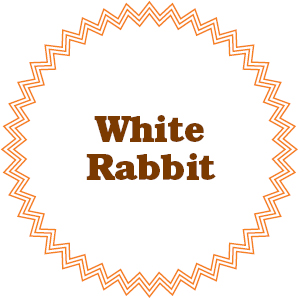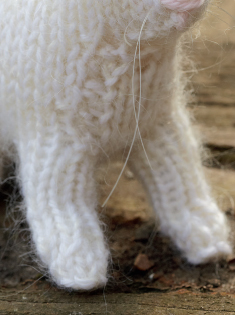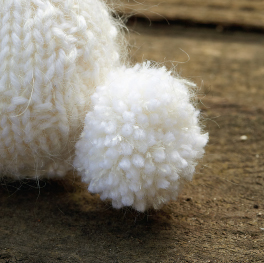

Prolific breeders, rabbits are well adapted for surviving without help on a farm. They have evolved to fight off predators: they have long ears to aid hearing and strong hind legs for hopping in a zigzag motion; their eyes have a wide field of vision and they sleep with them open; and they live in burrows. Having said all this, they are destructive little creatures, eating their way through our vegetable plot. It’s difficult to ascertain why rabbits are kept on farms, but they are charming and symbolic animals, representing fertility and rebirth at Easter.
With a pom-pom tail, the rabbit is adorable and easy to knit.
Length from nose to tail: 13cm (5in) Height to top of head (excluding ears): 10cm (4in)
• Pair of 2¾mm (US 2) knitting needles
• Double-pointed 2¾mm (US 2) knitting needles (for holding stitches)
• 10g (¼oz) of Rowan Pure Wool 4ply in Snow 412 (sn)
• 10g (¼oz) of Rowan Kidsilk Haze in Cream 634 (cr)
NOTE: most of this animal uses 1 strand of sn and 1 strand of cr held together, and this is called sncr
• Tiny amount of Rowan Pure Wool 4ply in Shell 468 (sl) for nose and ears
• 2 small pink beads for eyes and sewing needle and pink thread for sewing on
• Nylon thread or fishing line for whiskers
• 1 pipecleaner for front legs
See here.
With sncr, cast on 6 sts.
Beg with a k row, work 2 rows st st.
Row 3: Inc, [k2tog] twice, inc. (6 sts)
Work 5 rows st st.
Row 9: Inc, k4, inc. (8 sts)
Row 13: Cast (bind) off 4 sts, k to end (hold 4 sts on spare needle for Right Side of Body).

Front Legs
When attaching tummy to body, make sure the front legs are level.
Work as for Right Front Leg to *.
Row 13: K4, cast (bind) off 4 sts (hold 4 sts on spare needle for Left Side of Body).
With sncr, cast on 16 sts.
Beg with a k row, work 4 rows st st.
Row 5: K5, turn and work on these 5 sts only to shape Right Back Leg.
Beg with a p row, work 3 rows st st.
Cast (bind) off.
Row 5: Rejoin yarn to rem 11 sts, k to end.
Row 6: P2, k1, p8, cast on 2 sts. (13 sts)
Row 7: Inc, k1, p1, k7, p1, k2. (14 sts)
Row 8: P2, k1, p6, k1, p3, inc. (15 sts)
Row 9: Inc, k5, p1, k4, p1, k3. (16 sts)
Row 10: P4, k4, p8.
Row 11: Inc, k15. (17 sts)
Row 12: P2tog, p15, with WS facing p4 from spare needle of Right Front Leg. (20 sts)
Row 13: Knit.
Row 14: Purl.
Row 15: Inc, k19. (21 sts)
Row 16: P2tog, p19. (20 sts)
Row 17: Knit.
Row 18: P2tog, p18. (19 sts)
Row 19: Knit.
Row 20: P2tog, p17. (18 sts)
Row 21: Inc, k15, k2tog. (18 sts)
Row 22: P2tog, p16, cast on 3 sts. (20 sts)
Row 23: K18, k2tog. (19 sts)
Row 24: P2tog, p16, inc. (19 sts)
Row 25: K17, k2tog. (18 sts)
Row 26: Cast (bind) off 8 sts, p9 icos, inc. (11 sts)
Row 27: Knit.
Row 28: P9, p2tog. (10 sts)
Row 29: K2tog, k8. (9 sts)
Row 30: P2tog, p5, p2tog. (7 sts)
Row 32: P5, p2tog. (6 sts) Cast (bind) off.

Body
Knitted in two parts, the rabbit is sewn together along the spine.
With sncr, cast on 16 sts.
Beg with a p row, work 4 rows st st.
Row 5: P5, turn and work on these 5 sts only to shape Left Back Leg.
Beg with a k row, work 3 rows st st.
Cast (bind) off.
Row 5: Rejoin yarn to rem 11 sts, p to end.
Row 6: K2, p1, k8, cast on 2 sts. (13 sts)
Row 7: Inc, p1, k1, p7, k1, p2. (14 sts)
Row 8: K2, p1, k6, p1, k3, inc. (15 sts)
Row 9: Inc, p5, k1, p4, k1, p3. (16 sts)
Row 10: K4, p4, k8.
Row 11: Inc, p15. (17 sts)
Row 12: K2tog, k15, with RS facing k4 from spare needle of Left Front Leg. (20 sts)
Row 13: Purl.
Row 14: Knit.
Row 15: Inc, p19. (21 sts)
Row 16: K2tog, k19. (20 sts)
Row 17: Purl.
Row 18: K2tog, k18. (19 sts)
Row 19: Purl.
Row 20: K2tog, k17. (18 sts)
Row 21: Inc, p15, p2tog. (18 sts)
Row 22: K2tog, k16, cast on 3 sts. (20 sts)
Row 23: P18, p2tog. (19 sts)
Row 24: K2tog, k16, inc. (19 sts)
Row 25: P17, p2tog. (18 sts)
Row 26: Cast (bind) off 8 sts, k9 icos, inc. (11 sts)
Row 27: Purl.
Row 28: K9, k2tog. (10 sts)
Row 29: P2tog, p8. (9 sts)
Row 30: K2tog, k5, k2tog. (7 sts)
Row 31: Purl.
Row 32: K5, k2tog. (6 sts)
Cast (bind) off.
With sncr, cast on 4 sts.
Beg with a k row, work 42 rows st st.
Row 43: [K2tog] twice. (2 sts)
Work 2 rows st st.
Row 46: P2tog and fasten off.
(make 2 the same)
With sncr, cast on 4 sts.
Beg with a k row, work 2 rows st st.
Row 3: Inc, k2, inc. (6 sts)
Work 7 rows st st.
Row 11: K2tog, k2, k2tog. (4 sts)
Row 12: Purl.
Row 13: [K2tog] twice. (2 sts)
Row 14: P2tog and fasten off.
(make 2 the same)
With sl, cast on 3 sts.
Beg with a k row, work 10 rows st st.
Row 11: K2tog, k1. (2 sts)
Row 12: Purl.
Row 13: K2tog and fasten off.
With sncr, make a pom-pom.
Cut two 2.5cm (1in) cardboard discs and cut a 1.25cm (½in) hole in the centre of each. Hold the discs together and wind the yarn around the ring as evenly as possible until the hole is almost filled with yarn (it is quicker to wind several strands at once). Then thread the yarn onto a needle and continue to wind until the hole is closed up. Cut the yarn around the edge of the circles. Ease the cardboard discs slightly apart and wrap a long length of doubled yarn between them and around the centre of the pom-pom. Tie the pom-pom together tightly at the centre, leaving the long tail to use for attaching pom-pom to rabbit. Then cut the cardboard away from the pom-pom. Fluff up the pom-pom and trim if necessary.

Tail
Fluff up the pom-pom tail before attaching it.
SEWING IN ENDS Sew in ends, leaving ends from cast on and cast (bound) off rows for sewing up.
LEGS With WS together and whip stitch, fold each leg in half and sew up legs on RS, starting at paws.
BODY Sew around bottom, along body and around head to neck of rabbit.
TUMMY Sew cast on row of tummy to base of rabbit’s bottom, and sew cast (bound) off row to neck. Ease and sew tummy to fit body. Leave a 2.5cm (1in) gap between front and back legs on one side.
STUFFING Pipecleaners are used to stiffen the front legs and help bend them into shape. Fold a pipecleaner into a U-shape and measure against front two legs. Cut to fit approximately, leaving an extra 2.5cm (1in) at both ends. Fold these ends over to stop pipecleaner poking out of the paws. Roll a little stuffing around pipecleaner and slip into body, one end down each front leg. Starting at the head, stuff the rabbit firmly, then sew up the gap. Mould body into shape.
TAIL Attach pom-pom to rabbit’s bottom.
EARS With WS together, sew ear to lining. Slightly pinch bottom of each ear and sew cast on row to top of head, with lining facing outwards and 2 rows between ears.
EYES Sew on pink beads positioned as in photograph.
NOSE With sl, sew 2 vertical sts followed by 2 horizontal sts in a T-shape at tip of nose.
WHISKERS Cut six 8cm (3in) lengths of fishing line, thread through cheeks and trim.
